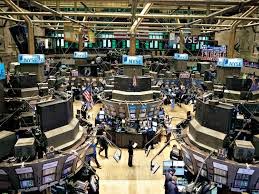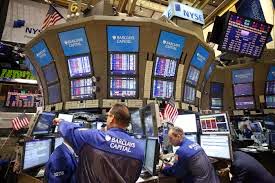US Markets
trade data and Brent
crude drops below $100 for the first time in over a year. Also Cashin
says a weaker euro and yen are signaling the beginning of a currency
war.
U.S. stocks mostly declined on Monday, with energy
producers leading losses on oil's drop to a multi-month low, as
investors retreated after a fifth week of gains lifted the S&P 500
to a record, with the Dow Jones Industrial Average not far behind.
"Everyone is trying to reconcile a month's worth of ridiculously good economic data and Friday's jobs report. How can the two be? It's confounding. It may take until Friday to get investors' confidence back up," said John Lynch, regional chief investment officer for Wells Fargo Private Bank.
The data from the Labor Department showed the creation of 142,000 jobs last month, so far from the 225,000 estimated that many economists dismissed it out of hand.
Read MoreReactions from three top economists
"I think Friday's retail sales will confirm strength in the auto sector rather than weakness in jobs," said Lynch, who believes Friday's nonfarm payrolls report for August will prove to be an anomaly.
"The rest of the world is still an issue," added Lynch.
Ford Motor slid after Morgan Stanley downgraded shares of the car manufacturer. Yahoo, which owns more than 22 percent of Alibaba Group Holding, rose after the e-commerce company said in a regulatory filing that it intends to raise up to $21.1 billion in an initial public offering.
"Everyone is trying to reconcile a month's worth of ridiculously good economic data and Friday's jobs report. How can the two be? It's confounding. It may take until Friday to get investors' confidence back up," said John Lynch, regional chief investment officer for Wells Fargo Private Bank.
The data from the Labor Department showed the creation of 142,000 jobs last month, so far from the 225,000 estimated that many economists dismissed it out of hand.
Read MoreReactions from three top economists
"I think Friday's retail sales will confirm strength in the auto sector rather than weakness in jobs," said Lynch, who believes Friday's nonfarm payrolls report for August will prove to be an anomaly.
"The rest of the world is still an issue," added Lynch.
Ford Motor slid after Morgan Stanley downgraded shares of the car manufacturer. Yahoo, which owns more than 22 percent of Alibaba Group Holding, rose after the e-commerce company said in a regulatory filing that it intends to raise up to $21.1 billion in an initial public offering.
The Dow Jones Industrial Average shed about 0.2 percent, with Exxon Mobil pacing blue-chip declines that extended to 21 of 30 components.
The energy sector fell the most among the 10 major industry groups on the S&P 500, which declined 0.3 percent, leaving it less than 6 points from its record closing hit, set Friday.
"The markets seem to be running on a treadmill, going far without going anywhere. While notching new all-time highs (just barely) the markets have gained very little over the past two weeks," offered Paul Nolte, senior vice president, portfolio manager at Kingsview Asset Management.
After wavering between gains and losses, the Nasdaq rose 0.2 percent.
For every share rising, less than two fell on the New York Stock Exchange, where 403 million shares traded as of 3:50 p.m. Eastern. Composite volume cleared 2.3 billion.
"The week of Sept. 11 is a nervous one in America, the more so today because of the barbaric activities of ISIS in Syria and Iraq and the fear that this violence could once again be visited on the United States. However, while the geopolitical situation continues to raise concerns, economic trends remain quite supportive of the equity market," David Kelly, chief global strategist at J.P. Morgan Funds, wrote in an emailed note.
The CBOE Volatility Index, one measure of investor uncertainty, rose 4.9 percent to 12.68.
"Worries about growth globally and of course geopolitical tensions, with the president's speech on Wednesday, that has investors on edge," said Alan Skrainka, chief investment officer at Cornerstone Wealth Management, referring to President Barack Obama's address to the nation, which is scheduled for a day after meetings with congressional leaders on Tuesday to lay out his plan to combat Sunni extremists of Islamic State.
"We'll see how aggressive his speech is, given all that is going on in the world today; I have not talked to any clients positioning for Wednesday," said Lynch at Wells Fargo Private Bank.
On the New York Mercantile Exchange, crude-oil futures for October delivery dropped 63 cents to $92.66 a barrel; gold futures for December delivery dropped $13.00 to $1,254.30 an ounce.
The dollar advanced against the currencies of major U.S. trading partners; the yield on the 10-year Treasury note used to figure mortgage rates and other consumer loans turned higher, up a basis point at 2.471 percent.
The Federal Reserve on Monday reported U.S. consumers increased their borrowing in July, led by rising car loans and higher credit card balances.
The dollar advanced against the currencies of major U.S. trading partners; the yield on the 10-year Treasury note used to figure mortgage rates and other consumer loans turned higher, up a basis point at 2.471 percent.
The Federal Reserve on Monday reported U.S. consumers increased their borrowing in July, led by rising car loans and higher credit card balances.













0 σχόλια:
Δημοσίευση σχολίου
Ο σχολιασμός επιτρέπεται μόνο σε εγγεγραμμένους χρήστες